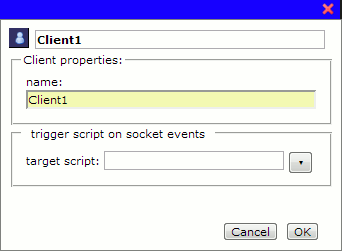Client Molecule
Add a client web socket.
| Client Molecule | |
| Preference Dialog | |
| Comments | Web socket requires a script molecule to receive socket events. |
| Properties | |
| type | string, ( r ) |
| pref.name | string, ( r ) |
| pref. | string, ( r, w ) |
| bufferedAmount | int, ( r ) |
| protocol | string, ( r ) |
| readyState | int, ( r ) |
| url | string, ( r ) |
| binaryType | string, ( r ) |
| Functions | |
| attach | |
| detach | |
| delete | |
| rename | |
| clone | |
| serialize | |
| connect | |
| send | |
| read | |
| close |
Comments
Web socket requires a script molecule to receive socket events. The events are passed to the script as input parameter params which has the following structure,
{ type: 'open' }
{ type: 'message' }
{ type: 'close', code: closeCode, reason: theReason, wasClean: true }
{ type: 'error'}When an error occurs during connection, the script molecule first recieves an error event followed by a close event. The close event provides further details about the error. See this page for more information on close event’s attributes and a full listing of close codes.
On receiving message event, the implementer can use read function to read available data from receive buffer.
pref.name
string, ( r )
The scriptable name for this molecule. This name can be set using rename function dynamically.
readyState
int, ( r )
The readyState attribute represents the state of the connection. It can have the following values,
| CONNECTING(0) | he connection has not yet been established. |
| OPEN(1) | The WebSocket connection is established and communication is possible. |
| CLOSING(2) | The connection is going through the closing handshake, or the close() method has been invoked. |
| CLOSED(3) | The connection has been closed or could not be opened. |
url
string, ( r )
Returns the result of resolving the URL that was passed to the web socket connect.
connect
connect(ws_url, protocols);
Connect to server at ws_url and optionally request server to select a sub-protocols to communicate.
Parameters
| ws_url | (string) a valid web socket server address. (e.g. ws://game.example.com:12010/updates’.) |
| protocols | (mixed) Optaional. Can be either a string or an array of strings. If it is a string, it is equivalent to an array consisting of just that string; if it is omitted, it is equivalent to the empty array. Each string in the array is a subprotocol name. The connection will only be established if the server reports that it has selected one of these subprotocols. |
Returns
(object) a web socket.
